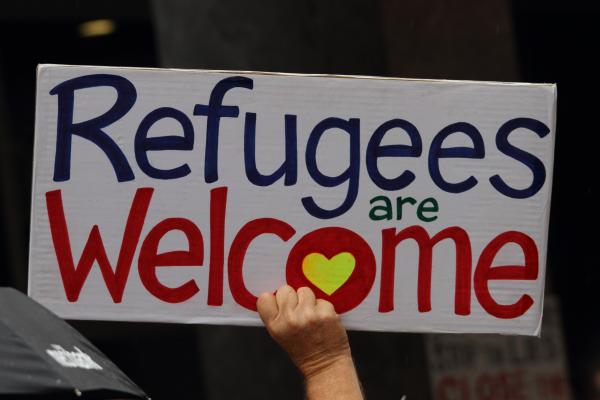While the media attention surrounding President Donald Trump's executive order restricting immigration has been on the prohibition of those coming from seven Muslim-majority countries, it’s important to remember the order also halts all refugee resettlement in the U.S. from any country for at least four months, and from Syria permanently. Thus, with one stroke of the pen, Donald Trump prohibited Christians and congregations from following the word of Jesus.
Sixty-five million people around the world have been displaced from their homes, and 51 percent of them are children. While the United States accepts only a small percentage of these people, refugee resettlement is one of the best social services done by religious groups. Organizations like Church World Service, Catholic Relief Services, World Relief, and many others, involving thousands of congregations, follow the words of Jesus: “I was a stranger, and you welcomed me.”
"Extreme vetting" is so firmly in place that coming as a refugee is the most secure way for a foreign person to enter the United States.
Donald Trump made continued promises in the campaign to defend religious liberty. But his executive order, along with its other failings, constitutes a direct attack on religious freedom, prohibiting churches and religious groups from carrying out actions that are an essential part of their expression of faith.
I am no constitutional lawyer. But I do know this: Donald Trump wants to remove the prohibition on church and religious organizations from supporting political candidates in the name of religious freedom, while they still receive tax-exempt contributions. How then can he prevent churches from engaging in an act of discipleship, which Jesus defines as a test of God’s eternal judgment? So, the government should allow pastors to endorse political candidates but prevent congregations from doing what Jesus says? What kind of definition of religious freedom is this?
Of course, the government can impose certain limitations on churches and religious groups exercising their convictions when an overriding public interest or constitutional right seem in conflict. But those cases are narrow, carefully drawn, and rare. The intended action of this executive order is sweeping and extreme. The attempt to justify it by national security is without foundation. Instead, this is another step in Donald Trump’s campaign to make us fear the one who is different and cling to nativist nationalism. All this multiplies the suffering of those whom Jesus calls us to welcome.
This executive order has many deficiencies, which are likely to be argued in the judicial process. Like other administrations, Donald Trump will try to cover the sins of his action in a cloak of national security. But as courts examine these claims in subsequent days, I trust that Christians will stand clear in their claim that no president should be allowed, without any justifiable warrant, to deny the free exercise of their religious convictions, especially when those actions serve not their own interests, but the displaced, suffering millions of strangers in the world longing for welcome.
Got something to say about what you're reading? We value your feedback!

